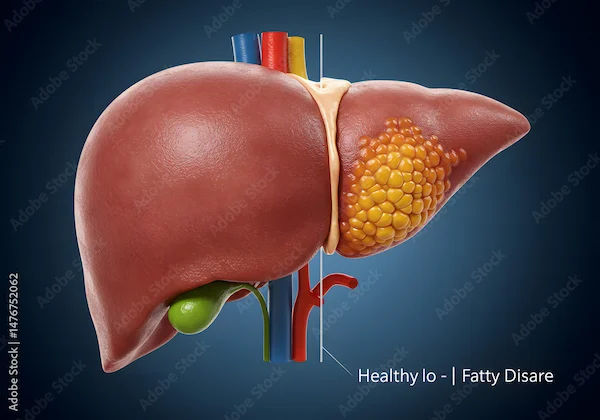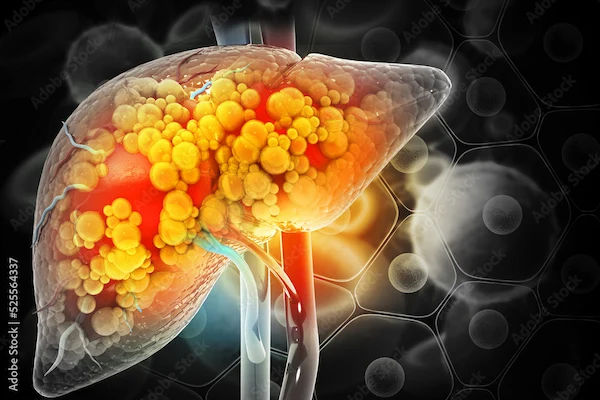How to Lower SGPT Levels Fast
Know what SGPT is, common causes, symptoms and how to lower SGPT naturally and more

.webp?tr=q-80,f-webp,w-350,dpr-2,c-at_max 700w)
Introduction
If you've recently had a blood test and found out that your SGPT (Serum Glutamic-Pyruvic Transaminase) levels are high, you might be feeling a bit worried. But don’t panic—high SGPT levels are often manageable with the right approach. In this article, we’ll explain what SGPT is, why it might be elevated, and how you can bring it down quickly and safely.
What is SGPT?
SGPT is an enzyme found mainly in the liver. When liver cells are damaged or inflamed, SGPT leaks into the bloodstream, causing higher-than-normal levels in blood tests. Doctors often check SGPT (also known as ALT – Alanine Aminotransferase) to assess liver health.
Normal SGPT Levels:
Men: 10–40 units per litre (U/L)
Women: 7–35 U/L
If your levels are slightly elevated, it may not always indicate a serious problem, but persistent high levels need attention.
Common Causes of High SGPT
Several factors can increase SGPT levels, including:
1. Fatty Liver Disease (NAFLD/NASH) – Excess fat in liver cells.
2. Hepatitis (Viral or Autoimmune) – Liver inflammation.
3. Alcohol Consumption – Heavy drinking damages liver cells.
4. Medications (e.g., Painkillers, Statins, Antibiotics) – Some drugs stress the liver.
5. Obesity & Poor Diet – Junk food and processed sugars contribute to liver fat.
6. Diabetes & Insulin Resistance – Affects liver function.
7. Muscle Injury – Intense exercise can temporarily raise SGPT.
Consult a Top nutritionist for the best advice
Symptoms of High SGPT
Sometimes, high SGPT doesn’t cause noticeable symptoms. However, if liver damage is significant, you may experience:
Fatigue
Abdominal pain (especially on the right side)
Nausea or vomiting
Yellowing of skin/eyes (jaundice)
Dark urine or pale stools
If you have these symptoms, consult a doctor immediately.
How to Lower SGPT Levels Fast
The good news is that with the right lifestyle changes, you can bring down SGPT levels naturally. Here’s how:
1. Eat a Liver-Friendly Diet
Increase Fruits & Vegetables: Antioxidant-rich foods like spinach, carrots, and berries help repair liver cells.
Choose Lean Proteins: Opt for fish, chicken, beans, and tofu instead of fatty meats.
Healthy Fats: Avocados, nuts, and olive oil support liver function.
Avoid Processed Foods: Cut down on sugary snacks, fried foods, and refined carbs.
2. Stay Hydrated
Drinking enough water helps flush out toxins. Aim for 8–10 glasses daily.
Herbal teas (like green tea or dandelion tea) can also support liver detox.
3. Reduce Alcohol & Avoid Smoking
Alcohol is a major cause of liver damage. If your SGPT is high, stop drinking completely until levels normalise.
Smoking also harms liver function, so quitting will help.
4. Exercise Regularly
Moderate exercise (like brisk walking, yoga, or swimming) helps burn excess fat and improves liver health.
Aim for 30–45 minutes daily.
5. Manage Weight
If you’re overweight, losing 5–10% of body weight can significantly reduce liver fat and lower SGPT.
6. Take Liver-Supporting Supplements
Milk Thistle: Helps repair liver cells.
Vitamin E: Reduces liver inflammation.
Turmeric (Curcumin): Has anti-inflammatory benefits.
(Always consult a doctor before taking supplements.)
7. Avoid Unnecessary Medications
Some painkillers (like acetaminophen) can worsen liver damage.
Check with your doctor before taking any new medications.
8. Get Enough Sleep
Poor sleep affects liver function. Aim for 7–8 hours of restful sleep nightly.
When to See a Doctor
If lifestyle changes don’t lower your SGPT within 4–6 weeks, or if levels are extremely high (above 100 U/L), consult a doctor. You may need further tests to rule out conditions like hepatitis or cirrhosis.
Final Thoughts
High SGPT levels are a warning sign that your liver needs care. By making simple changes—like eating clean, exercising, and avoiding alcohol—you can bring your levels down naturally. Stay consistent, and always consult a doctor if levels remain high.
Consult a Top nutritionist for the best advice
Consult a Top nutritionist for the best advice
Dr Sumanth R
General Physician
2 Years • MBBS
Bengaluru
PRESTIGE SHANTHINIKETAN - SOCIETY CLINIC, Bengaluru
Dr. Sasikamalam
General Practitioner
1 Years • MBBS
COIMBATORE
Apollo Sugar Clinic Coimbatore, COIMBATORE
Mrs Sneha P V
Nutritionist
10 Years • Master of science in Food and Nutrition
Bengaluru
Apollo Clinic, Sarjapur Road, Bengaluru

Dr. Ramalinga Reddy
General Physician
5 Years • MBBS MD General medicine
Bengaluru
PRESTIGE SHANTHINIKETAN - SOCIETY CLINIC, Bengaluru

Dr. Bhukya Pavan Kalyan
General Physician
5 Years • MBBS DNB Paediatrics
Bengaluru
PRESTIGE SHANTHINIKETAN - SOCIETY CLINIC, Bengaluru




